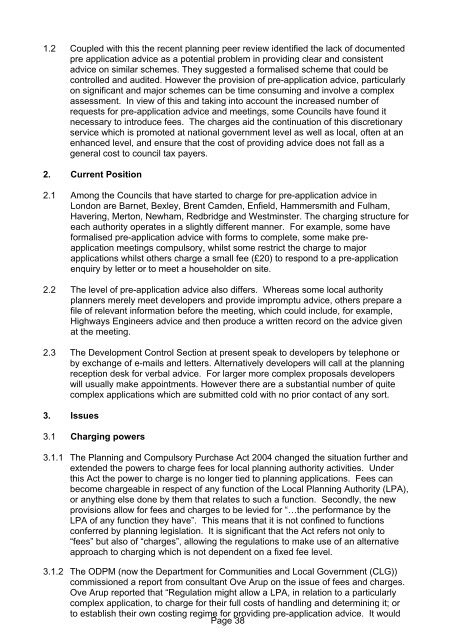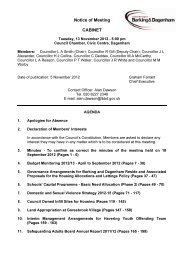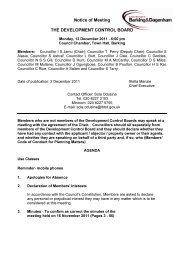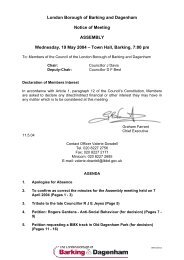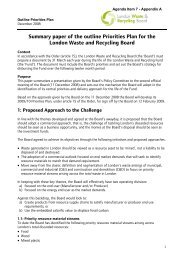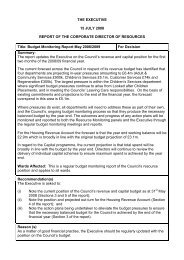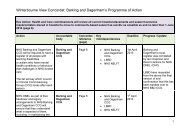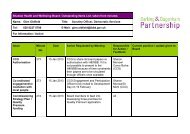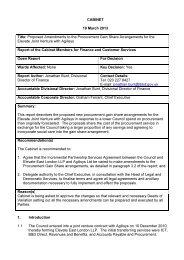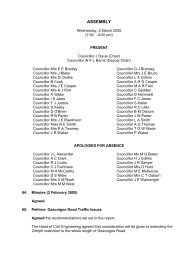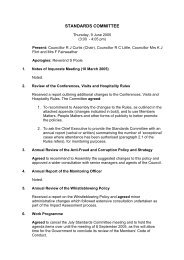Public reports pack PDF 8 MB - Meetings, agendas, and minutes ...
Public reports pack PDF 8 MB - Meetings, agendas, and minutes ...
Public reports pack PDF 8 MB - Meetings, agendas, and minutes ...
Create successful ePaper yourself
Turn your PDF publications into a flip-book with our unique Google optimized e-Paper software.
1.2 Coupled with this the recent planning peer review identified the lack of documented<br />
pre application advice as a potential problem in providing clear <strong>and</strong> consistent<br />
advice on similar schemes. They suggested a formalised scheme that could be<br />
controlled <strong>and</strong> audited. However the provision of pre-application advice, particularly<br />
on significant <strong>and</strong> major schemes can be time consuming <strong>and</strong> involve a complex<br />
assessment. In view of this <strong>and</strong> taking into account the increased number of<br />
requests for pre-application advice <strong>and</strong> meetings, some Councils have found it<br />
necessary to introduce fees. The charges aid the continuation of this discretionary<br />
service which is promoted at national government level as well as local, often at an<br />
enhanced level, <strong>and</strong> ensure that the cost of providing advice does not fall as a<br />
general cost to council tax payers.<br />
2. Current Position<br />
2.1 Among the Councils that have started to charge for pre-application advice in<br />
London are Barnet, Bexley, Brent Camden, Enfield, Hammersmith <strong>and</strong> Fulham,<br />
Havering, Merton, Newham, Redbridge <strong>and</strong> Westminster. The charging structure for<br />
each authority operates in a slightly different manner. For example, some have<br />
formalised pre-application advice with forms to complete, some make preapplication<br />
meetings compulsory, whilst some restrict the charge to major<br />
applications whilst others charge a small fee (£20) to respond to a pre-application<br />
enquiry by letter or to meet a householder on site.<br />
2.2 The level of pre-application advice also differs. Whereas some local authority<br />
planners merely meet developers <strong>and</strong> provide impromptu advice, others prepare a<br />
file of relevant information before the meeting, which could include, for example,<br />
Highways Engineers advice <strong>and</strong> then produce a written record on the advice given<br />
at the meeting.<br />
2.3 The Development Control Section at present speak to developers by telephone or<br />
by exchange of e-mails <strong>and</strong> letters. Alternatively developers will call at the planning<br />
reception desk for verbal advice. For larger more complex proposals developers<br />
will usually make appointments. However there are a substantial number of quite<br />
complex applications which are submitted cold with no prior contact of any sort.<br />
3. Issues<br />
3.1 Charging powers<br />
3.1.1 The Planning <strong>and</strong> Compulsory Purchase Act 2004 changed the situation further <strong>and</strong><br />
extended the powers to charge fees for local planning authority activities. Under<br />
this Act the power to charge is no longer tied to planning applications. Fees can<br />
become chargeable in respect of any function of the Local Planning Authority (LPA),<br />
or anything else done by them that relates to such a function. Secondly, the new<br />
provisions allow for fees <strong>and</strong> charges to be levied for “…the performance by the<br />
LPA of any function they have”. This means that it is not confined to functions<br />
conferred by planning legislation. It is significant that the Act refers not only to<br />
“fees” but also of “charges”, allowing the regulations to make use of an alternative<br />
approach to charging which is not dependent on a fixed fee level.<br />
3.1.2 The ODPM (now the Department for Communities <strong>and</strong> Local Government (CLG))<br />
commissioned a report from consultant Ove Arup on the issue of fees <strong>and</strong> charges.<br />
Ove Arup reported that “Regulation might allow a LPA, in relation to a particularly<br />
complex application, to charge for their full costs of h<strong>and</strong>ling <strong>and</strong> determining it; or<br />
to establish their own costing regime for providing pre-application advice. It would<br />
Page 38


